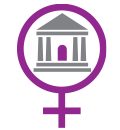 Women in local government
Women in local government
Gender equity is a priority for CLGF members and the Commonwealth. The Commonwealth is working towards gender equity and has set a target of a minimum of 30 per cent of women in public life – both in elected leadership positions and administration – including at the local level. A key focus is developing strategies to increase women's participation in decision making.
Sub-topics:
- Engaging women in consultation and planning
- Gender mainstreaming in service delivery
- Women as local government leaders
Featured
FCM women in local government program resources
A selection of resources from FCM on women in local government
Author: FCM Publisher: FCM Publication year: 2017
Municipal Elections in Canada: a guide for women candidates
This guide is designed to be a resource for women and for men who wish to promote the role of women in municipal politics. When reading this guide, remember that there is no single way to conduct election campaigns. In addition, this guide is by no means exhaustive. Municipal election policies and regulations vary by province and territory.
Author: FCM Publisher: FCM Publication year: 2017
Women’s Representation and Participation in District Assemblies in Ghana: Analysis of Supply-Side and Demand-Side Framework
The quest for increased female representation and participation at the local level government in Ghana has not been obtained probably because we have neglected the demand and supply side factors that account for the paucity of policies and programmes to promote participation of women in the local government system in Ghana. Women involvement in decisionmaking processes in governance for sustainable development is very critical not only because they constitute majority of the Ghanaian population but they are discriminated and underrepresented in the socio-economic and political development activities thereby bringing about not only a gender gap but also exclusion of women and their needs, interests and perspectives from governance. This paper examines the demand and supply side framework so as to prompt stakeholders in their bid to enhance the presence of women in the local government system in Ghana. It also looks at the concept of local government system in Ghana and examines the statistics of women’s representation in the district assemblies. It concludes that women must strive to empower themselves by acquiring the knowledge, skills, resources (i.e. time, money) and motivation. NGOs, political parties as well as government and its agencies should put in place positive discriminatory policies and programmes as well as legislations that will bring social change to encourage and attract women in local level governance.
Author: Janet Serwah Boateng and Isaac Kosi Publication year: 2017
Women in local government: stories of inspiration from Fiji
This booklet celebrates the achievements and important contributions women make to local government and their communities. It showcases to the sector and wider community the diversity, competence, influence, dedication and passion of both current and past female local government employees and councillors. The challenges faced by the women in this publication are also real and highlights the need change on a number of levels.
Author: CLGF Pacific Publisher: CLGF Publication year: 2017
A Framework for Developing Gender Policies for Political Parties
This Framework outlines key considerations for developing a party’s gender policy, and addresses a variety of thematic areas essential for the advancement of women and promotion of gender equality within political parties, including leadership formation, internal decision making, internal oversight and institutional development, candidate recruitment, party programmes and platform development, outreach to voters, and campaigns.
Author: International IDEA Publisher: International IDEA Publication year: 2017



